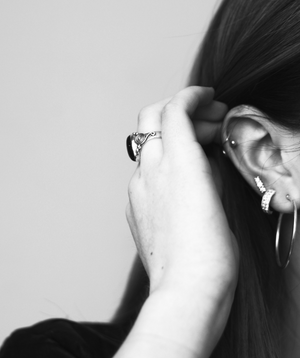
The Pros and Cons of Getting a Piercing
Piercings have become increasingly popular over the years, with people of all ages and backgrounds choosing to adorn their bodies with various forms of jewelry. From simple earlobe piercings to more elaborate nose, eyebrow, or tongue piercings, there are many options to choose from. While getting a piercing can be an exciting and meaningful experience, it's important to weigh the pros and cons before making a decision. In this article, we'll explore the benefits and drawbacks of getting a piercing.
Pros:
Self-expression: One of the primary reasons people get piercings is for self-expression. Piercings can be a way to showcase your individuality and style. They can also be a form of rebellion or a way to distinguish yourself from others.
Aesthetics: Piercings can enhance your appearance and complement your features. For example, a nose piercing can draw attention to your eyes, while an ear piercing can add a pop of color or sparkle to your overall look.
Cultural significance: Piercings have been a part of many cultures for centuries and can hold significant cultural or spiritual meaning. For example, nose piercings are common in Indian and Middle Eastern cultures, while lip piercings are common in African tribes.
Healing benefits: Some piercings, such as acupuncture ear piercings or daith piercings, are believed to have healing benefits. Acupuncture piercings can help with stress and anxiety, while daith piercings are said to relieve migraines.
Cons:
Pain: Piercings can be painful, and the level of pain varies depending on the location and type of piercing. Some people may have a low pain tolerance or may experience more discomfort during the healing process.
Infection: Piercings can become infected if they are not properly cared for during the healing process. Infections can cause pain, swelling, and even scarring. It's important to follow proper aftercare instructions to reduce the risk of infection.
Allergic reactions: Some people may have allergic reactions to certain metals or materials used in piercings. It's important to choose jewelry made from hypoallergenic materials, such as surgical steel or titanium, to reduce the risk of an allergic reaction.
Workplace restrictions: Some workplaces have dress codes that prohibit visible piercings. It's important to consider whether a piercing may affect your employment opportunities or advancement in your career.
In conclusion, getting a piercing can be a fun and exciting way to express yourself, but it's important to weigh the pros and cons before making a decision. If you decide to get a piercing, make sure to choose a reputable piercer and follow proper aftercare instructions to reduce the risk of infection or other complications.
Pros:
Self-expression: One of the primary reasons people get piercings is for self-expression. Piercings can be a way to showcase your individuality and style. They can also be a form of rebellion or a way to distinguish yourself from others.
Aesthetics: Piercings can enhance your appearance and complement your features. For example, a nose piercing can draw attention to your eyes, while an ear piercing can add a pop of color or sparkle to your overall look.
Cultural significance: Piercings have been a part of many cultures for centuries and can hold significant cultural or spiritual meaning. For example, nose piercings are common in Indian and Middle Eastern cultures, while lip piercings are common in African tribes.
Healing benefits: Some piercings, such as acupuncture ear piercings or daith piercings, are believed to have healing benefits. Acupuncture piercings can help with stress and anxiety, while daith piercings are said to relieve migraines.
Cons:
Pain: Piercings can be painful, and the level of pain varies depending on the location and type of piercing. Some people may have a low pain tolerance or may experience more discomfort during the healing process.
Infection: Piercings can become infected if they are not properly cared for during the healing process. Infections can cause pain, swelling, and even scarring. It's important to follow proper aftercare instructions to reduce the risk of infection.
Allergic reactions: Some people may have allergic reactions to certain metals or materials used in piercings. It's important to choose jewelry made from hypoallergenic materials, such as surgical steel or titanium, to reduce the risk of an allergic reaction.
Workplace restrictions: Some workplaces have dress codes that prohibit visible piercings. It's important to consider whether a piercing may affect your employment opportunities or advancement in your career.
In conclusion, getting a piercing can be a fun and exciting way to express yourself, but it's important to weigh the pros and cons before making a decision. If you decide to get a piercing, make sure to choose a reputable piercer and follow proper aftercare instructions to reduce the risk of infection or other complications.



Leave a comment